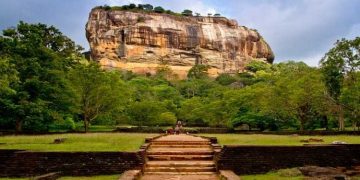Ancient Greece, one of the most incredible places on earth, has been home to some of the world’s greatest thinkers and creators. From the Acropolis in Athens to the ruins of Delphi, exploring this timeless land will transport you back in time to another era. Discover what makes Ancient Greece so unique – read on to explore its wonders!
Overview of Ancient Greece
From the Minoans and Mycenaeans to the Hellenistic Age, Greece is a land with a wealth of history and culture. With so much to see and do, it’s hard to know where to start. That’s why we’ve put together an overview of some of the must-see sights in Ancient Greece.
The Acropolis: No trip to Greece would be complete without a visit to the Acropolis. This ancient citadel is home to some of the most famous buildings in the world, including the Parthenon and the Temple of Athena Nike.
The Parthenon: The Parthenon is perhaps the most iconic building in Greece. Built in honor of Athena, goddess of wisdom and warfare, this temple is one of the most recognizable symbols of Ancient Greece.
The Temple of Athena Nike: The Temple of Athena Nike is another must-see sight on the Acropolis. This small temple was built to honor Athena Nike, goddess of victory, and features some beautiful sculptures depicting scenes from Greek mythology.
The Ancient Agora: The Ancient Agora was the heart of public life in Athens. This extensive archaeological site includes a number of well-preserved buildings, including the Temple of Hephaestus and the Stoa of Attalos.
Famous Landmarks and Locations of Ancient Greece
From the Parthenon in Athens to the Oracle of Delphi, ancient Greece is home to some of the most famous landmarks and locations in history. These iconic places have been capturing the imaginations of people for centuries, and continue to do so today.
The Parthenon: The Parthenon is perhaps the most famous landmark associated with Country. This massive temple was built atop the Acropolis in Athens between 447 and 438 BC. It was dedicated to the goddess Athena and served as a symbol of Athenian power and prestige. The Parthenon has been damaged and rebuilt several times over the centuries, but it still stands today as one of the most impressive examples of ancient Greek architecture.
Oracle of Delphi: The Oracle of Delphi was a priestess who was said to be able to prophesize the future. She was located at the Temple of Apollo in Delphi, and people from all over Country would travel there to seek her advice. The Oracle’s predictions were often cryptic, but they were always taken very seriously by those who heard them.
Temple of Zeus: The Temple of Zeus was one of the largest temples in ancient Country. It was located in Olympia, and was used for religious festivals honoring Zeus, the king of the gods. The temple was also used as a venue for important political meetings during Olympia’s time as a major city-state.
Contributions to Culture, Arts and Sciences
The Wonders of a Timeless Land: Contributions to Culture, Arts and Sciences
Country was a land full of wonder and amazement. From the awe-inspiring temples and statues, to the brilliant works of art and literature, the Greeks were a people who left an indelible mark on Western culture. But what was it about this ancient civilization that was so special? What made their culture and arts so influential that it is still felt today?
One answer may lie in the fact that the Greeks were some of the first to develop key concepts in both philosophy and science. In fact, many of the ideas that we take for granted today were first developed by Greek thinkers. For example, Socrates introduced the idea of questioning everything in order to find truth, while Aristotle laid the foundations for modern biology and botany.
Important Figures in Ancient Greek History
In Country, there were many important figures that helped shape the course of history. Some of these figures include:
-Aristotle: A famous philosopher and scientist who wrote on a wide range of topics, including physics, astronomy, biology, and ethics. He was also a tutor to Alexander the Great.
-Socrates: A well-known philosopher from Athens who is best known for his Socratic Method of questioning. He was put to death by the state on charges of corrupting the youth.
-Plato: A student of Socrates and a famed philosopher in his own right. He founded the Academy in Athens, one of the earliest known institutions of higher learning.
-Alexander the Great: One of the most successful military commanders in history. He conquered much of the known world before his death at a young age.
Religion & Mythology of Greece
The ancient Greeks were a religious people. They believed in many gods and goddesses, who they thought controlled everything in the world. They built temples and offered sacrifices to these gods.
Greek mythology is a collection of stories about the gods and goddesses, heroes and heroines of Country. These stories were passed down from generation to generation, and were often used to explain natural phenomena or historical events.
Some of the most famous characters in Greek mythology include Apollo, Zeus, Athena, Hades, Persephone, Demeter, Orpheus and Eurydice. The story of Achilles and the Trojan War is also popular.






























